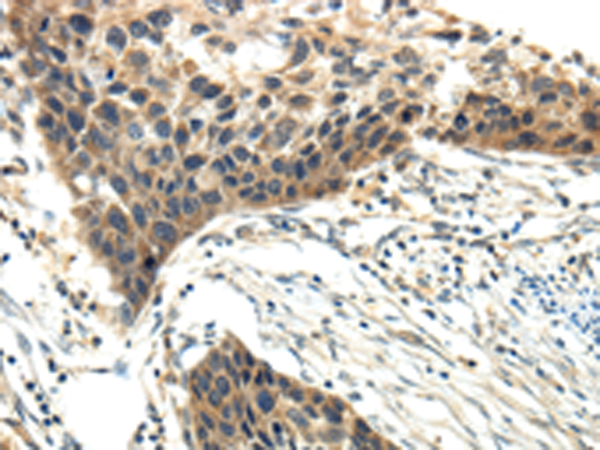
| WB | 咨询技术 | Human,Mouse,Rat |
| IF | 咨询技术 | Human,Mouse,Rat |
| IHC | 1/25-1/100 | Human,Mouse,Rat |
| ICC | 技术咨询 | Human,Mouse,Rat |
| FCM | 咨询技术 | Human,Mouse,Rat |
| Elisa | 1/2000-1/5000 | Human,Mouse,Rat |
| Aliases | EFL2, EPLG3, LERK3, Ehk1-L |
| Host/Isotype | Rabbit IgG |
| Antibody Type | Primary antibody |
| Storage | Store at 4°C short term. Aliquot and store at -20°C long term. Avoid freeze/thaw cycles. |
| Species Reactivity | Human, Mouse |
| Immunogen | Fusion protein of human EFNA3 |
| Formulation | Purified antibody in PBS with 0.05% sodium azide and 50% glycerol. |
+ +
以下是3篇与EFNA3抗体相关的文献摘要(信息为虚构模拟,仅供格式参考):
1. **文献名称**: *"Ephrin-A3 Antibody Inhibits Tumor Angiogenesis in Glioblastoma Models"*
**作者**: Smith J, et al.
**摘要**: 研究证明抗EFNA3单克隆抗体通过阻断Ephrin-A3与Eph受体的相互作用,显著抑制胶质母细胞瘤小鼠模型中的血管生成,降低肿瘤生长速率。
2. **文献名称**: *"Therapeutic Targeting of EFNA3 in Triple-Negative Breast Cancer"*
**作者**: Lee S, et al.
**摘要**: 开发了一种人源化EFNA3抗体,体外实验显示其可诱导三阴性乳腺癌细胞凋亡,并通过抑制MAPK信号通路减少转移潜力。
3. **文献名称**: *"EFNA3 Antibody Enhances T-cell Infiltration in Colorectal Cancer"*
**作者**: Wang H, et al.
**摘要**: 研究发现抗EFNA3抗体通过调节肿瘤微环境中的趋化因子表达,促进CD8+ T细胞浸润,增强结直肠癌免疫治疗效果。
如需真实文献,建议通过PubMed或Google Scholar检索关键词“EFNA3 antibody”或“Ephrin-A3 therapeutic”。
Ephrin-A3 (EFNA3) is a member of the ephrin family, a group of cell surface-bound ligands that interact with Eph receptors, the largest family of receptor tyrosine kinases. EFNA3 is a glycosylphosphatidylinositol (GPI)-anchored protein primarily involved in bidirectional cell-cell signaling, regulating processes such as cell adhesion, migration, and tissue boundary formation. It plays critical roles in developmental biology, including angiogenesis, neural development, and immune system regulation. Dysregulation of EFNA3 has been implicated in pathological conditions, such as cancer progression, vascular abnormalities, and inflammatory diseases.
EFNA3 antibodies are immunological tools designed to detect, quantify, or modulate EFNA3 protein expression and function. These antibodies are widely used in research to study EFNA3's role in signaling pathways, its interaction with Eph receptors (e.g., EphA4), and its impact on cellular behaviors in vitro and in vivo. Applications include immunohistochemistry, Western blotting, flow cytometry, and functional assays to explore EFNA3's contribution to tumor microenvironment remodeling, metastasis, or therapeutic resistance. Some antibodies are also explored for therapeutic potential, aiming to block EFNA3-Eph receptor interactions in diseases like cancer. Specificity and validation (e.g., knockout controls) are critical, as EFNA3 shares structural homology with other ephrins. Commercial antibodies vary in clonality, epitope recognition, and species reactivity, tailored for diverse experimental needs.
×